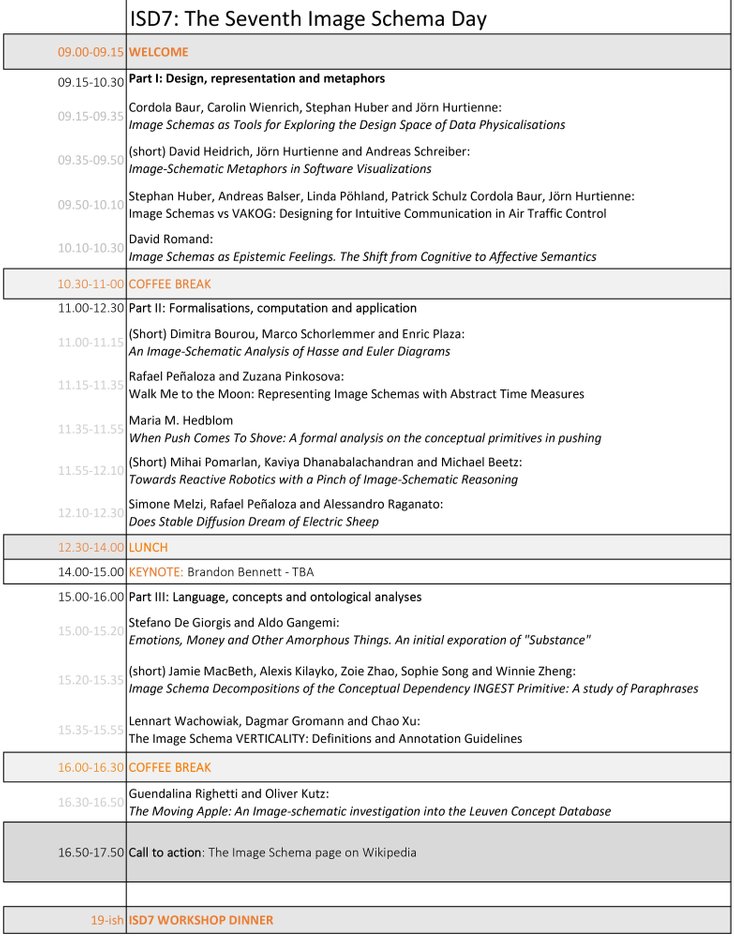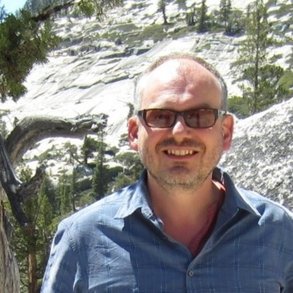The Seventh Image Schema Day
ISD7 will take part of the workshop program of
The 20th International Conference on Principles of Knowledge Representation and Reasoning (KR2023)
September 2-4, 2023
Rhodes, Greece
Workshop at KR2023
This year, the ISD7 has been accepted as one of the workshops taking part in KR2023. We are very excited about this opportunity as the conference is known to draw a large audience interested in topics related to the ISD workshop's central theme: the formal treatment of conceptual patterns and image schemas!
KR2023 is also co-located with:
- The 21st International Workshop on Non-Monotonic Reasoning (NMR2023), and
- The 36th International Workshop on Description Logics (DL2023).
Three major scientific events that certainly will provide an interesting scientific foundation, offer new collaboration opportunities and provide a larger audience for the Image Schema Day to flourish!
JOIN US!
About the Workshop
The Image Schema Day (ISD) is a workshop series devoted to the interdisciplinary research field of conceptual patterns, spatiotemporal reasoning and image schemas.
As a workshop focus lies on discussing progressive research, building new and exciting collaborations, and presenting progressive research!
Previous editions can be on this site or on:
Dates
Title registration deadline: June 2nd
Submission deadline: June 12th
Notification of acceptance: July 4th
Camera-ready version: September 16th
Workshop: September 2, 2023
Tentative Program
Keynote speaker
Brandon Bennett
Conceptions of Concepts: Frege vs Lakoff/Johnson, are they reconcilable?
Abstract: The talk will consider two radically different views of the nature of "concepts". For Frege, concepts are precise abstract entities that are independent from and only imperfectly perceived by humans. But cognitive linguists, such as Lakoff and Johnson, regard concepts as flexible and grounded in physical experience. Is there any way these views could be reconciled?
I suggest that by examining ambiguities in the word "concept" itself, and in how we construe the role of concepts in relation to meaning and reality, we may be able to accommodate both platonic and embodied conceptions of concepts within a semantic framework that is tolerant to variability of interpretations. I will contrast approaches to semantic variability based on "fuzzy logic" and "prototype theory" with
approaches based on "standpoint semantics" and"type coercion". The analysis will be illustrated in relation to the concept of "containment", which is often taken to be a paradigm "image schema" but can also be considered as an abstract geometrical concept.
Dr. Bennett is a Lecturer at the University of Leeds, UK. For many decades he has been working on spatiotemporal representation and reasoning, semantics for actions and events, and non-classical logics. His perhaps most famous contribution in regards to image schemas is the formal work on the region connection calculus (RCC). As a influential scientist, Bennett has written over 250 scientific articles, Google Scholar reports an H-index of 37, and over 5000 citations!
Ever the provocative debater, Dr. Bennett has promised the ISD7 a discussion-worthy keynote with plenty of opportunity for reflection, inspiration, and application! Don't miss it!
Dr. Bennett is a Lecturer at the University of Leeds, UK. For many decades he has been working on spatiotemporal representation and reasoning, semantics for actions and events, and non-classical logics. His perhaps most famous contribution in regards to image schemas is the formal work on the region connection calculus (RCC). As a influential scientist, Bennett has written over 250 scientific articles, Google Scholar reports an H-index of 37, and over 5000 citations!
Ever the provocative debater, Dr. Bennett has promised the ISD7 a discussion-worthy keynote with plenty of opportunity for reflection, inspiration, and application! Don't miss it!
Instructions for
Submissions and Proceedings
Topics
The workshop welcomes papers and talks from all scientific, artistic and industrial disciplines on the topic of image schemas and closely related notions.
Topics include
(but are not limited to):
- analysis of conceptual metaphors
- formalisation of affordances and force dynamics
- spatiotemporal reasoning
- commonsense reasoning
- conceptual modelling
- use cases of embodied cognition
- formal approaches to analogical reasoning
- formal concept analysis
- applications in cognitive robotics
- image-schematic interface design
- art and literature analysis
Submission details
Submissions must follow
new 1-column CEUR-ART Style (https://ceurws.wordpress.com/2020/03/31/ceurws-publishes-ceurart-paper-style).
After peer-reviewing, the camera-ready version of all accepted papers will be published in the ISD7 proceedings.
Authors of abstracts may turn their contributions into a full research paper after the workshop. After a second round of reviews, accepted papers will be included in the proceedings.
Paper formats
Abstracts for presentation: 2 pages. Not included in the proceedings.
Extended abstract: a minimum of 5 pages. Submission containing preliminary work or summaries of previously published papers.
Full research papers: 5-10 pages. Must be novel contributions not submitted for publication elsewhere.
Join the workshop!
Participation in the workshop is required by at least one author of papers to be presented at the workshop and included in the proceedings.
Registering is done on the KR2023 website:
https://kr.org/KR2023/registration/
People involved in the workshop
Committes
Organisation:
Maria M. Hedblom, Jönköping University, Sweden
Oliver Kutz, Free University of Bozen-Bolzano, Italy
Program committee (tentative):
- Taisuke Akimoto, independent researcher
- Stefano Borgo, Laboratory for Applied Ontology, ISTC-CNR, Trento
- João Miguel Cunha, University of Coimbra
- Stefano De Giorgis, Alma Mater University of Bologna
- Zoe Falomir,Universitat Jaume I
- Jörn Hurtienne, Julius-Maximilians-Universität Würzburg
- Rafael Peñaloza, University of Milano-Bicocca
- Mihai Pomarlan, Bremen University
- Guendalina Righetti, Free University of Bolzano
- Marco Schorlemmer, Artificial Intelligence Research Institute (IIIA), CSIC
- Nikolaos Tsiogkas, KU Leuven
- Paola Vernillo, Alma Mater Università di Bologna


